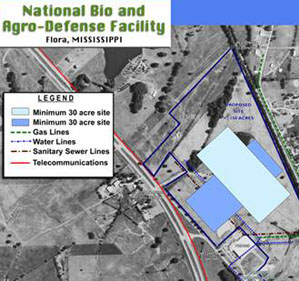
| Home | Information Sharing & Analysis | Prevention & Protection | Preparedness & Response | Research | Commerce & Trade | Travel Security | Immigration |

The threat level in the airline sector is High or Orange. Read more.

The Gulf States Bio and Agro-Defense Consortium is a coalition of public and private entities working collectively to attract the National Bio and Agro-Defense Facility (NBAF) to Mississippi. The Consortium is comprised of the State of Mississippi, the University of Mississippi (UM), the University of Mississippi Medical Center (UMMC), Mississippi State University (MSU), Jackson State University (JSU), Tulane University, the Tulane National Primate Research Center, the University of Texas Medical Branch (UTMB), Tougaloo College, and Battelle Memorial Institute. Except for UTMB, all members of the Consortium are within a two-hour drive of the proposed site. The Consortium has committed to providing regular shuttle services to and from the NBAF for all university participants.

The proposed site is located in the Flora Industrial Park in Madison County, Mississippi. A mixed-use commercial park, the Flora site offers a gentle rolling terrain with nearby access to interstates, railways, and the Jackson-Evers International Airport. The Madison County Economic Development Agency maintains the park's more than 150 acres. The portion under consideration for the NBAF currently has no tenants or physical structures and is approximately 150 acres. The only tenant in the Flora Industrial Park is Primus, a manufacturing company.
The Consortium partners bring a diverse set of capabilities and significant biosafety level 3 (BSL-3) and BSL-4 experience to NBAF operations. MSU has a veterinary school, maintains significant research programs in animal sciences, and operates a BSL-3 facility on its main campus. MSU also operates the state diagnostic veterinary laboratory in Pearl, Mississippi, a 40,000 square foot facility that will have an active BSL-3 within two years. The university also has collaborations with the U.S. Department of Agriculture Agricultural Research Services (ARS), a facility that has the distinction of possessing the greatest number of agricultural doctorate degrees in the nation. The UM has a world renowned program in pharmaceutical sciences that would be crucial to NBAF's countermeasure development and licensing activities. The National Center for Natural Products located at UM currently screens more than 30,000 samples and houses more than 18,000 natural products with proven medicinal/agricultural properties. UMMC and Tulane University have programs in medical research and in clinical trial development and execution.
Currently, UMMC has over 350,000 square feet of research space, with an additional 178,000 square feet of new construction to be completed within two years. UMMC researchers have recently been recognized at the national level for research involving anthrax and potential treatments. Both institutions have infectious diseases doctoral and medical training and operate BSL-3 facilities certified by the Centers for Disease Control and Prevention and Federal Drug Administration. TNPRC has a free-standing 3,000-square foot facility dedicated to BSL-3 animal research. UTMB has an established research program in infectious diseases directly relevant to bioterrorism and operates one of the few BSL-4 facilities in the nation. Battelle has a long history of successfully managing national laboratories, including West Jefferson BSL-3 laboratory, the Oak Ridge National Laboratory and the National Biodefense Analysis and Countermeasures Center. Battelle is responsible for the operation of over 50,000 square feet of research facilities with research and development totaling over $4 billion. JSU has a National Center for Environmental Health and the National Center for Biodefense Communications.
The Consortium also provides a strong workforce for the NBAF in Mississippi. JSU and Tougaloo College are Historically Black Colleges and Universities that produce significant numbers of African-Americans in the sciences. Collectively, the Consortium graduates approximately 40 doctorate-, 100 masters- and 370 baccalaureate-level students in relevant life sciences each year (average over the past five years). Their fields of study include biology, chemistry, biochemistry, animal sciences and physiology, bioengineering, and pharmaceutical sciences. Annually, approximately 100 medical doctors, 50 doctors of veterinary medicine, and 75 professional pharmacists graduate from the Consortium academic partners. Currently, approximately 60 percent of bachelor-level and above-degree professionals leave the area because life sciences opportunities cluster elsewhere in the nation.
The proposed site is adjacent to U.S. Route 49, a major four-lane divided highway. It is connected via major highways Interstate 55 (approximately 17 miles), which supports north/south interstate traffic, and to Interstate 20 (approximately 20 miles), which supports east/west interstate traffic. The State of Mississippi will commit to providing any needed utility improvements for the NBAF. The utilities for the site are supplied by Entergy Corporation, which has a three-phase power onsite. Natural gas is available onsite (6-inch main). Water is supplied by the Town of Flora. Currently, the site is supplied by a 10-inch pipe adjacent to the site, with 100,000- and 200,000-gallon storage tanks located within 0.75 miles. Sewer services (treatment plant) are also provided by the Town of Flora; there is currently an 8-inch main adjacent to the site.
This page was last reviewed/modified on September 13, 2007.